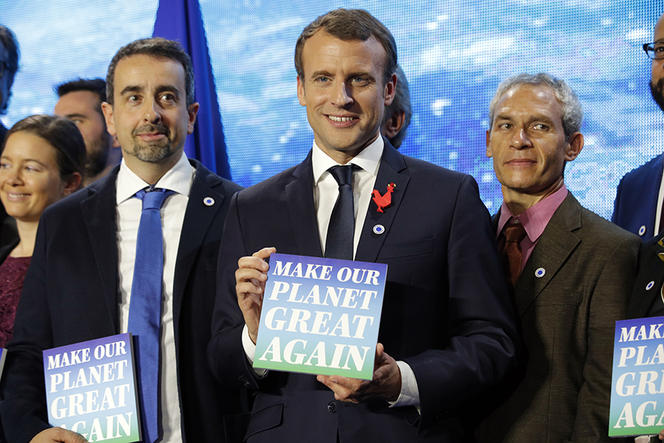Make Our Planet Great Again 2019
Spotlight on the Make Our Planet Nifty Again programme, launched in June 2017 by French President Emmanuel Macron. Its first conference will be held on 1st October in Paris.
"We're getting out." This seemingly niggling judgement, uttered on 1st June, 2017 by the US President Donald Trump, sent a daze wave around the world. These words actually meant that the United states of america was withdrawing from the Paris Climate Agreement, a historic text signed in the French capital at the stop of 2015 past 194 other countries, with a view to keeping the increase in global average temperature "well below 2°C" above pre-industrial levels. Hence the immediate decision taken by French President Emmanuel Macron to invite "whatever scientists, engineers, entrepreneurs, or committed citizens" who felt allow down or were adversely affected by the U-plough of the occupant of the White House, to come (or render) to French republic to work "on concrete solutions for the climate".
"The climate emergency poses unique challenges for science," says CNRS Chairman and CEO Antoine Petit, on the eve of the first conference of the Brand Our Planet Neat Once again (MOPGA)1 programme, to be be held on 1st October at the Musée du Quai Branly in Paris, in the presence of the French and German Research Ministers. "Adaptation and/or mitigation solutions must exist based on the best available scientific data. To generate this knowledge and use it, President Macron chosen for the implementation of an international call for proposals giving researchers who have resided outside of France for at least ii years the opportunity to carry out innovative work in French laboratories on the issue of global modify, including climate change," Antoine Petit explains.

French President Emmanuel Macron holds a sign with the slogan 'Make our planet not bad once again' as he attends the 'Tech for Planet' event at the 'Station F' start-upwardly campus ahead of the One Planet Summit in Paris on Dec 11, 2017.
A €sixty million budget
The MOPGA programme, whose budget amounts to €60 million, is focused on understanding the physical, chemical, biological and other mechanisms that govern the World arrangement, besides every bit sustainable development and energy transition. Half of this sum is provided by the General Secretariat for Investment (SGPI) and managed past the French National Research Bureau (ANR), while the other half is supplied by the host institutions.
"Not every euro contributed by the latter is necessarily in the grade of cash," Antoine Petit points out. "The contribution can perfectly well be made 'in kind', that is, past making an appropriate assessment of the human and technological environment (possibility of using cutting-border instruments, access to platforms, etc.) in which the successful candidate works. And it is important to underline that, in addition to the involvement of the ANR and the laboratories, regional partners also play a meaning role, which reflects the motivation of all the stakeholders concerned past the project."
The process adopted for the pick of candidates, whether junior (i.e. those who obtained their PhD less than 12 years ago) or senior (over 12 years ago), was carried out in two stages, in both 2017 and 2018.
In the first stage, led by the CNRS on behalf of all the French research organisations, applicants were assessed on the quality of their CVs. In the second, supervised by the ANR, an international jury evaluated the projects pre-selected by the CNRS and adult past the researchers working together with the teams of the labs they hoped to join. The jury was chaired by Corinne Le Quéré, Professor of Climate Modify Science at the University of Eastward Anglia (UK), and head of the French Loftier Council for Climate Change (HCC) since November 2018. Made up of nine or x members, depending on the year, the interdisciplinary jury included French and Finnish climatologists, a chemist and a biologist from the US, a Swiss economist and a Japanese sustainability specialist.
Sharing out the funding
"The projects we examined in the first yr (2017) were more focused on World system sciences, with relatively few submissions dealing with the humanities and social sciences or issues related to sustainable development and energy transition. However, this tendency was reversed in 2018," Corinne Le Quéré notes. "Overall, the submissions were of a very high standard. The claiming was how to share out the funding between very good senior projects and highly promising inferior ones. Additionally, some proposals that were interesting but required further improvement, were reworked following our recommendations, resubmitted to the jury and eventually validated, which is very gratifying."
Figures testify to the fact that French republic's call for tenders has attracted the interest of the scientific community well beyond its borders. When the plan was launched on the MOPGA website, managed by the public agency Campus France, more 11,000 clicks and contact requests from students and researchers from effectually 100 countries, companies, NGOs, etc. were recorded. Over 400 researchers expressed interest in long-term stays. A full of 340 applications were submitted, of which 43 were selected by the jury. "By supporting 21 of the 43 projects selected, the CNRS is past far the research organization with the greatest involvement in the MOPGA plan," says Antoine Petit, who likewise points out that 40 of the 43 projects are existence conducted in CNRS joint inquiry units, in other words together with other institutions.
The bewitchery of the CNRS
The role played past the flagship of French research is hardly surprising, given that "the quality of its work on global change, including climate change, is internationally recognised," adds Stéphanie Thiébault, manager of the CNRS Constitute of Ecology and Environment. In fact, the CNRS ranks tertiary in the "Earth and environmental sciences" category in the 2019 Index of the journal Nature, just backside the Chinese Academy of Sciences and the Helmholtz Association of German Enquiry Centres. "Our laboratories are highly attractive, which is why a large number of successful candidates wanted to bring together them," Thiébault comments.

Sit-in, strike and march for the planet. Paris, Place du Pantheon, March 15, 2019.
A win-win rationale
Then have laureates found information technology difficult to adapt to French habits and customs, and especially to the intricacies of the country's administration? "To our cognition, all participating institutions have done everything they can to help the successful applicants fix ofttimes complex authoritative documents," Antoine Petit says. "In our case, two advisers took them through authoritative procedures: one at the CNRS office in Washington (US), and the other at the Mission for Transversal and Interdisciplinary Initiatives in Paris."
About importantly, the MOPGA project is based on a win-win rationale. The outstanding scientists selected for the quality of their CVs and the originality of their proposals savor a stimulating environment in the internationally renowned institutions that host them, while these organisations in plough derive scientific added value from their presence.
"For instance, the United states of america chemist Christopher Cantrell, who in March 2018 joined the Inter-Academy Laboratory of Atmospheric Systems (LISA)2 for five years with the aim of studying the large-scale climate and wellness impact of pollution, brings with him not but his ideas, experience, methodology, and and so on, but likewise his connections with other international laboratories and his funding networks. This makes it a long-term contribution," explains Nicolas Arnaud, director of the CNRS National Institute for Earth Sciences and Astronomy (INSU). The arrival of a researcher such equally Venkatramani Balaji (a Canadian scientist of Indian origin who was previously at Princeton University), whose work is bringing nigh a revolution in climate modelling methods, "opens upwardly new windows for our research and enhances our visibility. Bacon is far from existence the principal motivation for MOPGA applicants. What convinced them was the programme's relevance and the excellence of the labs. Moreover, some have obviously seized this opportunity to return to work in France", adds Elsa Cortijo, managing director of the LSCE,three which, in add-on to Balaji, is hosting three successful candidates from the US and one from Nippon.
French-German cooperation
In charge of the scientific coordination of the projection at the national level, the CNRS is too involved in it at the European scale with its colleagues from the German Academic Commutation Service (DAAD), Federal republic of germany having joined the initiative at the French-German summit in July 2017 and prepare up a similar programme (same selection procedures, aforementioned subjects).
"The upkeep allocated to this programme, dubbed Make Our Planet Great Once more-High german Enquiry Initiative (MOPGA-GRI), amounts to €15 million for the period 2017-2022," explains DAAD's Anke Stahl. "Nosotros are funding a total of 13 research projects, seven of which are led by researchers who until now have lived and worked in the The states, such as biologist Christina Richards and physicist Yutsung Tsai. The main organisations involved are the Universities of Augsburg and Leipzig, the Constitute for Advanced Sustainability Studies, Potsdam, the Karlsruhe Institute of Technology, the Leibniz Institute for Research on Evolution and Biodiversity, Berlin, and the Helmholtz Center Geesthacht. The joint running of the initiative should give rising to fruitful exchanges between the teams concerned on both sides of the Rhine and, more generally, strengthen French-German scientific cooperation." To this end, a mid-term conference will be held in Strasbourg (French republic), and a closing conference in Berlin (Federal republic of germany) in 2022.
———————————————————————————————
Who are the successful candidates?
Of the 43 applicants selected by the jury, 12 are women and 31 are men. 23 are inferior candidates (having obtained their PhD less than 12 years ago), while 20 are senior candidates (PhD holders for at least 12 years). 12 are from the US, 12 from France (mostly working in the US), 6 from Canada, iii from Germany, 3 from Kingdom of spain, and one each from Greece, Italian republic, Peru, the UK, Switzerland, Moldova and Japan.
Which subjects?
> Earth system sciences: nineteen projects
> Climate change and sustainability: 17 projects
> Free energy transition: 7 projects
Source: https://news.cnrs.fr/articles/make-our-planet-great-again-they-chose-france
0 Response to "Make Our Planet Great Again 2019"
إرسال تعليق